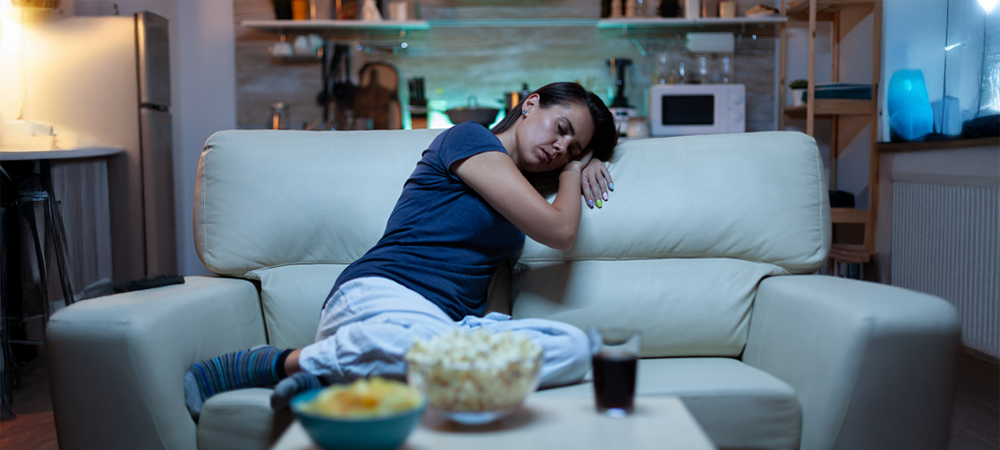
Sometimes, occasional post-meal fatigue might seem like a normal part of digestion. However, could it actually be a symptom of something more serious? This blog explores when and how extreme fatigue after meals qualifies as a sign of diabetes.
Understanding Post-Meal Sleepiness
We all have been there at some point in our lives: enjoying a scrumptious feel, feeling full, and a wave of drowsiness shows up. Suddenly, we are struggling to keep our eyes open. At times, this can simply be a natural process. But in some cases, this signifies an underlying condition, like diabetes. Before we address the specific question of ‘Is falling asleep after eating a sign of diabetes, it’s important to understand why we feel sleepy after eating in general.
After we eat, our body goes through a series of procedures. The body’s blood flow shifts to the intestines to aid the digestive process. Consequently, the controlled blood flow in the rest of our body makes us feel lousy and unenergized. Additionally, the types of foods we eat also play a role in how alert or sluggish we feel post-meal. For instance, meals heavy in fat or carbs may cause blood sugar levels to rise sharply followed by a steep fall right after. Therefore, it might leave one feeling exhausted.
The Role of Insulin and Blood Sugar Levels
If you are wondering, “Why does sugar make me feel tired?” The answer lies in the body’s management of blood sugar levels. Normally, insulin helps the body transport the energy from food into the cells. However, in people with diabetes, insulin either isn’t utilized efficiently or isn’t produced in sufficient amounts, leading to abnormal blood sugar levels.
In the context of our primary question, ‘Is falling asleep after eating a sign of diabetes’, it is important to consider that diabetic people encounter frequent fluctuations in their sugar levels. Soon after a meal is consumed, repetitive spikes and drops in blood sugar may occur. These abrupt changes contribute to the urge to fall asleep after eating. Importantly, this is more noticeable in individuals with undiagnosed or poorly managed diabetes.
Why Does Diabetes Cause Fatigue After Meals?
So, why does diabetes cause this specific kind of fatigue? Typically, when the body’s sugar content is too high, the body makes tremendous efforts to effectively utilize it. The body may attempt to get rid of this excess sugar through frequent urination. Eventually, this leads to dehydration — a major contributor to fatigue. If not addressed promptly, diabetes can lead to other complex conditions like diabetic kidney, hypertension, and hypercholesterolemia.
Additionally, people with diabetes may experience insulin resistance. In this scenario, the body’s cells do not respond well to insulin, leading to higher blood sugar levels. Gradually, this process disrupts the normal flow of energy in the body, resulting in fatigue. This fatigue is usually more noticeable after eating, making people wonder if falling asleep after eating is a sign of diabetes.
What Else Can Cause Sleepiness After Eating?
Now, we know that diabetes can be a major cause of sleepiness after eating. But is it the only cause? In one word: No. Sleepiness after having a meal can have other reasons as well. For example, the type of diet you are consuming also determines how you feel afterward.
Heavy, carb-rich, and fatty foods can lead to a series of spikes and crashes in energy levels, resulting in exhaustion. Having a turkey for dinner can lead to serotonin buildup, a hormone that helps regulate sleep. Additionally, conditions like sleep apnea, hypothyroidism, and even certain medications, can also lead to excessive tiredness after eating.
When Should You Be Concerned?
Are you worried and often find yourself thinking, “Is feeling sleepy after eating a sign of diabetes?”
Firstly, know that occasional drowsiness post-meal is usually normal. However, if your sleepiness is accompanied by other diabetes symptoms such as frequent urination or extreme thirst, then remember that falling asleep after eating could be a sign of diabetes. Factors like the type of food you eat, the size of the meal, or the time of day are all factors that may influence your sleepiness.
Addressing the issue early can help you manage the condition before it leads to more serious complications. A doctor may recommend tests, such as a fasting blood glucose test or an HbA1c test, to check for diabetes. Early diagnosis and prompt treatment can significantly help you manage your diabetes symptoms. Furthermore, enrolling in diabetes clinical trials helps you navigate the condition competently.
How to Manage Post-Meal Fatigue?
If you are concerned that your post-meal fatigue is a sign of diabetes, these are some measures you can take to manage it:
Balanced Meals:
Try incorporating proteins, fibers, and healthy fats into your daily diet. These will help your blood sugar stay within the normal ranges.
Smaller Portions:
Instead of large and heavy portions, switch to smaller, nutritious, and more frequent meals.
Less Carbohydrates:
Replace your sugary and carb-rich food with whole-grains, lean proteins, and vegetables. This will help you avoid the immediate desire to sleep after eating.
Hydration:
If you are stressed and wondering why sugar makes you tired, dehydration may be the answer. Consume optimal water daily, especially if you feel overly lethargic.
Exercise:
Frequent exercise increases energy levels, enhances insulin sensitivity, and controls blood sugar levels.
Monitoring:
Lastly, do not forget to take your blood sugar readings more often. This is uncompromisable when you are diabetic or at a higher risk of developing it.
Conclusion – Staying Alert and Managing Diabetes
In conclusion, is falling asleep after eating a sign of diabetes? It could be, especially if you experience other symptoms of the condition. While post-meal sleepiness is common for many people, if it’s frequent or accompanied by other warning signs like excessive thirst, unexplained weight loss, or blurry vision, it’s important to consult with a healthcare professional. Also, enrolling in clinical trials is a helpful option for getting a better idea of your health.






